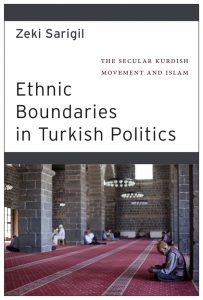A new book, by Assoc. Prof. Zeki Sarıgil of the Department of Political Science, has just been published by New York University Press. The book, “Ethnic Boundaries in Turkish Politics: The Secular Kurdish Movement and Islam,” is available as an e-book as well as in hard copy.


The publisher’s summary, noting that “Ethnic Boundaries in Turkish Politics” traces the evolving relations between the leftist, secular Kurdish movement and Islam in the Turkish context, describes the book as follows:
“In the last decades, the Kurdish ethnonationalist movement in Turkey, rooted in strong secularism and Marxism, has adopted a much more positive approach towards Islam. Employing ethnic boundary-making theory as a primary theoretical framework and utilizing various data sources such as elite interviews, textual analyses, ethnographic fieldwork and electoral data, this study examines the puzzling ‘Islamic opening’ of the secular, leftist Kurdish movement in the last decades. Regarding main arguments, this work divides the evolving relations between the Kurdish movement and Islam into three different stages: a) an indifferent/apathetic and/or antagonistic attitude in the 1970s and 1980s, b) an increasingly Islam-friendly approach in the 1990s and c) an accommodative attitude since the early 2000s. Approaching such an intriguing trajectory from the perspective of boundary-making theory, this study treats the Kurdish movement’s Islamic opening as a major case of boundary work, and suggests that each of these periods is associated with a different boundary-making strategy: boundary contraction, boundary expansion and boundary reinforcement, respectively. With respect to the causes of the Kurdish movement’s boundary expansion (i.e. its Islamic opening), this work draws attention to the role of four causal factors: the declining influence of Marxism; the need to expand its social basis and popularity; electoral politics; and legitimacy struggles against rival political actors. This study further shows that the Kurdish movement’s boundary making was not without any tension or contestation. The boundary expansion by Kurdish ethnopolitical elites triggered both internal and external boundary contestations. The movement’s embrace of Islam on a more widespread level has major ramifications for politics in Turkey and in the region. ‘Ethnic Boundaries in Turkish Politics’ has important insights into modern Turkish and Islamic societies and highlights the increasing role of Islam in global politics.”
